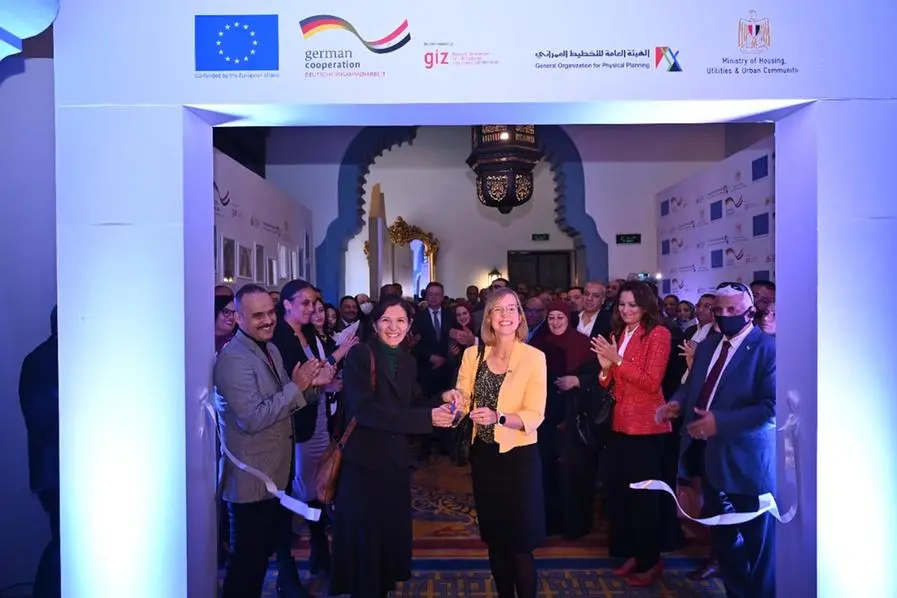PHOTO
Cairo, Egypt: GIZ Egypt announced the achievements of its Participatory Infrastructure Project (PIP), which is funded by the European Union and the German Government. The project is implemented in partnership with the Ministry of Housing, Utilities and Urban Communities, represented through the General Organisation of Physical Planning. PIP successfully implemented 29 infrastructure projects in 9 informal settlements in Cairo, Giza and Qalyubeya Governorates, which contribute to the socio-economic developments of these areas.
PIP’s achievements are considered a remarkable success and represent a notable step towards the improvement of living conditions in informal settlements and the upgrade of the infrastructure through the participatory approach.
The ceremony highlighting the achievements was attended by Ambassador Frank Hartmann, the German Ambassador to Egypt, Ambassador Christian Berger, the Head of the EU Delegation to Egypt, Eng. Alaa El Din Abdel Fattah, the Head of General Organization of Physical Planning.
Eng. Alaa El Din Abdel Fattah, the Head of General Organization of Physical Planning, stated that the PIP is a practical model for integrating a new approach for future plans set to achieve the SDGs at the local level. Additionally, the participatory approach, taken by the PIP, has succeeded in producing a balanced and integrated developmental program on a short- and medium-term duration that ensures developments on urban, socio-economic and environmental levels assisting in the sustainable development vision. These plans were the basis for selecting infrastructure projects that have been accomplished through the PIP, totaling a number of 29 projects.
In parallel, the PIP has implemented a number of projects and initiatives to support NGOs and civil society organizations through a local initiative fund that was aided by community participation, in coordination with the Ministry of Social Solidarity.
Moreover, he stressed that the European Union, the German government, and representatives from the Egyptian government have expressed their pridefulness of the strategic and fruitful cooperation, which led to developmental gains.
The Ministry of Housing, Utilities and Urban Communities, in cooperation with GIZ Egypt, have supported sustainable development and improved socio-economic and environmental living conditions for those most in need through the provision of better services.
Mr. Frank Hartmann, the German Ambassador to Egypt, affirmed that Egypt is a major partner to Germany in the region. The two countries have built a strong and well-established bilateral relationship and Germany is a key partner in supporting the SDGs in Egypt, as evident from multiple ongoing projects in as part of the cooperation between Egypt and Germany.
Adding that the PIP started back in 2017, and successfully overcame many challenges in making possible the achievements we are announcing today. With 18 civil society initiatives funded complimenting infrastructure projects for residents within informal settlements, in cooperation with the Ministry of Social Solidarity through the Local Initiative Fund.
Mr. Christian Berger, the Ambassador of the European Union to Egypt, expressed his delight with the achievements of the Participatory Infrastructure Project. The Project, he stated, highlights the importance of the strategic relationship between the EU and Egypt and the EU’s interest in supporting Egypt to achieve the SDGs. The Ambassador confirmed that the EU is keen to take part in further joint cooperation in the future.
Within the framework of the Project, GIZ Egypt has provided training courses to more than 250 participants from the public sector on various development aspects, such as integrating and implementing sustainable development goals in planning processes.
In addition, the Project upgraded the educational sector through developing schools and providing students and with IT equipment and furniture, while reducing the density of students within classes through building an additional school annex at Khosoos Primary School, providing a better educational environment for around 60,000 students and training 200 teachers on innovative and active learning methods in all three governorates. Further, the Project supplied medical equipment to hospitals and health centers to support an improved quality of medical services provided to more than 3 million citizens, and strengthened youth provision and recreational services for 15,000 beneficiaries.
-Ends-




















